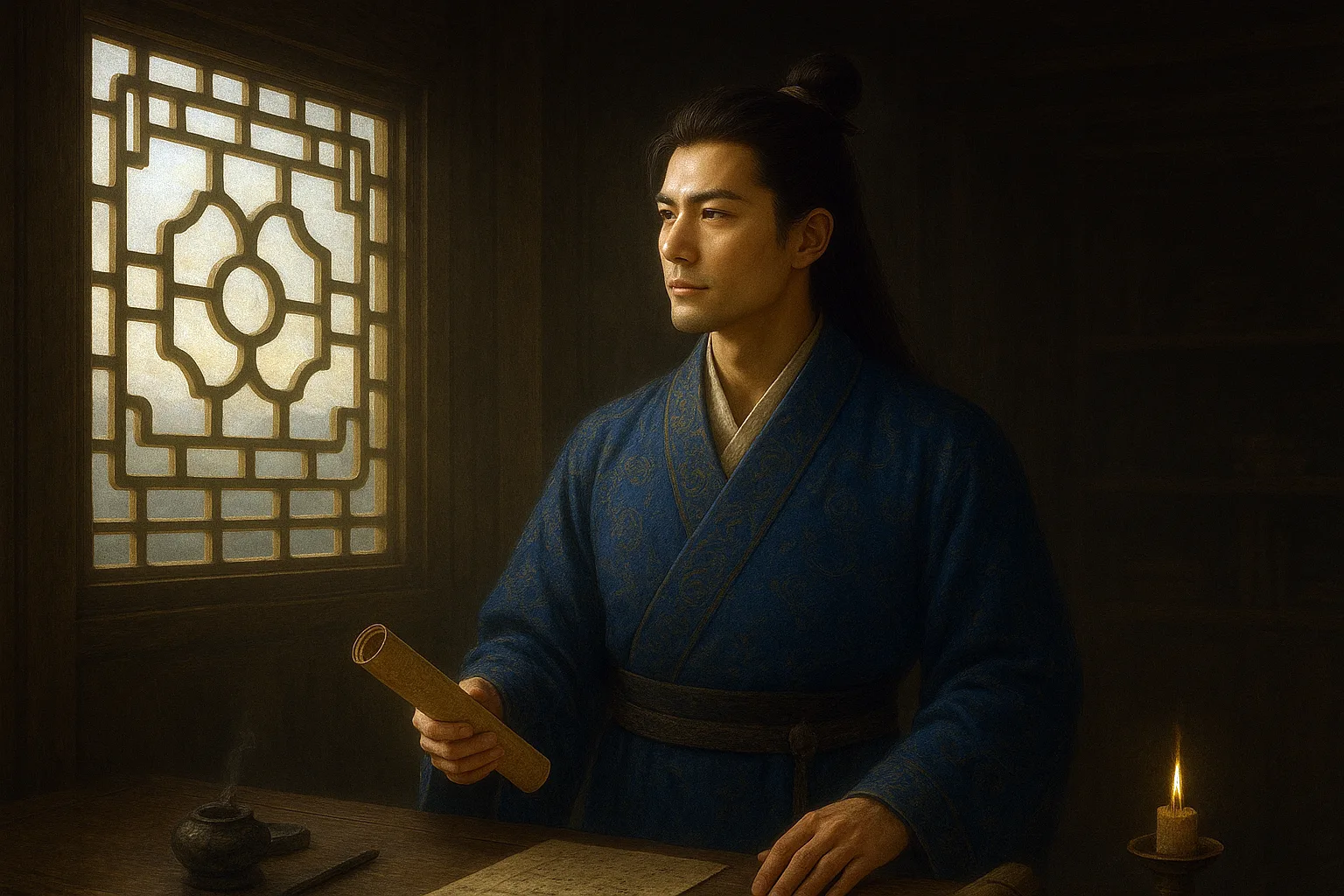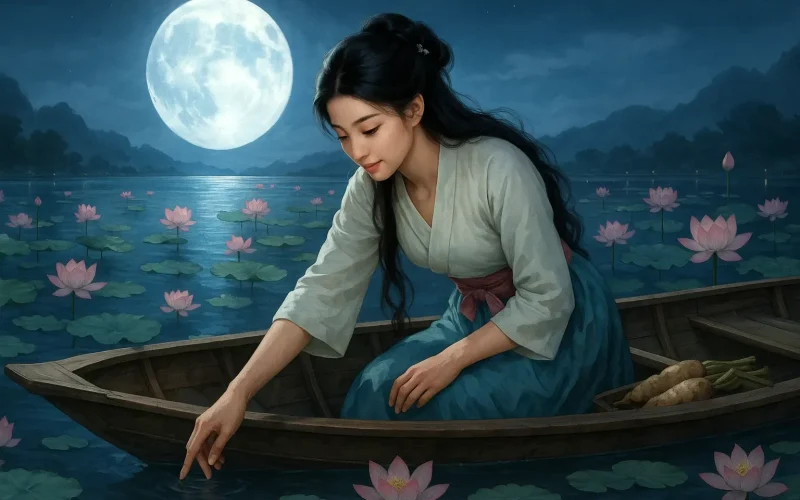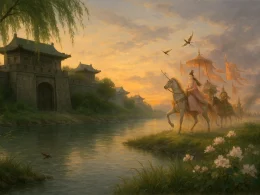The autumn festival comes slow;
The Weaving Maid’s heart full of woe.
The racing Dragon vies this day;
The bridging magpies vied the way.
Surprised, before the glass she’s shy;
Her silken robe she won’t untie.
But who can make the night longer last?
To weave with greater art next year as ’tis past.
Original Poem
「牛女」
沈佺期
粉席秋期缓,针楼别怨多。
奔龙争度日,飞鹊乱填河。
失喜先临镜,含羞未解罗。
谁能留夜色,来夕倍还梭。
Interpretation
This poem draws on the legend of the Cowherd and the Weaver Maid meeting on the Qixi Festival. On the seventh night of the seventh month, the two lovers separated by the Milky Way are reunited for a single night—a motif frequently used by classical poets to symbolize love, longing, and separation. Shen Quanqi, active in the early Tang court, was well-versed in the ornate tradition of occasional poetry but gradually infused it with genuine emotion. In this work, he uses the celestial lovers’ story, set against the Milky Way on Qixi, to express the yearning and sorrow of mortal women, while also reflecting his own lament on the impermanence of union and the fragility of deep affection.
Terms like “powdered mat” and “needle tower” refer to spaces where palace women adorned themselves and practiced needlework—associations the poet uses to connect the Weaver Maid’s celestial sorrow with the earthly feelings of women in the inner chambers. This exemplifies Shen Quanqi’s characteristic technique of “using heaven to reflect humanity, and deities to convey emotion.”
First Couplet: "粉席秋期缓,针楼别怨多。"
Fěn xí qiū qī huǎn, zhēn lóu bié yuàn duō.
On the powdered mat, the autumn meeting feels delayed; In the needle tower, the sorrow of parting grows heavy.
“Powdered mat” denotes a woman’s dressing area; “autumn meeting” refers to the Qixi date. The word “delayed” is richly evocative—conveying both the anxiety of waiting and the slow passage of time. Adopting the Weaver Maid’s voice, the poet uses two specific settings—“powdered mat” and “needle tower”—to depict the intertwined emotions of anticipation and separation, rendered with subtle yet intricate psychological detail.
Second Couplet: "奔龙争度日,飞鹊乱填河。"
Bēn lóng zhēng dù rì, fēi què luàn tián hé.
Galloping dragons race against the sun; Fluttering magpies haphazardly bridge the river.
This couplet portrays the wondrous spectacle of the Qixi night sky. Dynamic verbs like “gallop,” “race,” and “fluttering” vividly capture the urgency and chaos of the celestial crossing. Natural phenomena and human emotion merge: the Weaver Maid’s anxiety seems to set the Silver River astir, as even the spirits of nature are stirred. This technique of “using movement to heighten emotion” infuses the mythical scene with human feeling.
Third Couplet: "失喜先临镜,含羞未解罗。"
Shī xǐ xiān lín jìng, hán xiū wèi jiě luó.
Her joy fading, she first approaches the mirror; Blushing shyly, she has yet to loosen her silk robes.
The focus shifts from celestial imagery back to human sentiment. Though aware their reunion is brief, the Weaver Maid remains nervous—both eager and apprehensive. The paired phrases “joy fading” and “blushing shyly” convey complex emotions with fine nuance. Preening before the mirror reflects mortal habit; shyness before meeting embodies feminine nature. The poet vividly humanizes the mythical figure.
Fourth Couplet: "谁能留夜色,来夕倍还梭。"
Shéi néng liú yè sè, lái xī bèi huán suō.
Who can prolong the night, so that when next eve comes, The shuttle’s return need not be repaid twofold?
The poem concludes with a questioning tone that lingers in the reader’s mind. Knowing the Milky Way will soon divide them again, the Weaver Maid sighs at life’s impermanence with the wish to “prolong the night.” The final phrase, “the shuttle’s return repaid twofold,” carries a double meaning: it alludes both to her resumption of weaving duties and to the redoubled longing that follows separation—a poignant yet restrained expression of sorrow.
Holistic Appreciation
Narrated from the Weaver Maid’s perspective, the poem progresses emotionally layer by layer:
- The first couplet expresses longing before the meeting;
- The second depicts the urgency of the reunion;
- The third captures the shyness upon meeting;
- The final couplet conveys the grief of impending parting.
The structure is as precise as a musical composition, deepening in resonance through subtle emotional shifts. Shen Quanqi does not merely recount a myth but infuses it with mortal joy and sorrow, making the “celestial love” a symbol of human emotion.
He excels at detail: “powdered mat” and “needle tower” evoke the wait and preparation before the meeting; “mirror” and “silk robes” reveal the tenderness and restraint of the encounter; “night” and “shuttle” suggest the endless longing that follows. The poem employs dynamic verbs—“delayed,” “race,” “fluttering,” “approach,” “loosen,” “prolong”—creating a lively rhythm that underscores the emotional tension, showcasing the musicality and affective power of early Tang regulated verse.
Artistic Merits
- Humanizing the Divine, Blending Real and Imagined: Using the Weaver Maid’s story to convey mortal emotions, enriching the legend with realistic feeling.
- Scene and Emotion Fused, Movement Enhances Feeling: Dynamic descriptions of the Silver River—galloping dragons, fluttering magpies—intensify the urgency of love.
- Subtle and Refined Language: Each five-character line leaves room for aftertaste, with smooth rhythm and natural parallelism.
- Distinct Feminine Perspective: Delicate yet not frail, rich in psychological portrayal, reflecting Shen Quanqi’s unique narrative style focused on women.
Insights
The Weaver Maid’s annual reunion, brief and soon followed by parting, symbolizes the fate of countless sincere yet transient bonds in the human world. With a gentle brush, Shen Quanqi reminds us: every encounter in this world is a gift; to know and cherish one another within limited time is already heaven’s tenderest moment.
About the Poet

Shen Quanqi (沈佺期 c. 656–715), courtesy name Yunqing, was a native of Neihuang in Henan Province and an important poet of the early Tang Dynasty. Along with Song Zhiwen, he was renowned as one of the "Shen-Song" duo, whose work played a decisive role in finalizing the form of the five-character regulated verse (wuyan lüshi) in Tang poetry. His poems often include courtly compositions and travel-themed reflections, characterized by refined elegance and structural rigor. Shen was particularly skilled in the seven-character regulated verse (qilü), and his writing marks a transition from the lingering style of the Six Dynasties to the flourishing era of High Tang poetry. His contributions hold milestone significance in the development of modern-style verse (jintishi).












